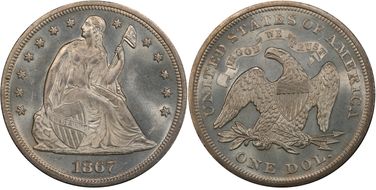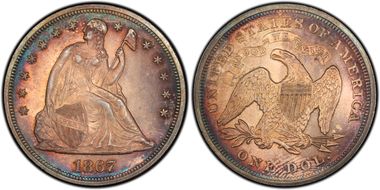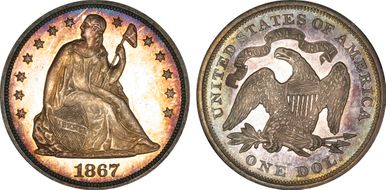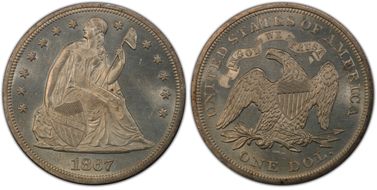1867 $1 MS61 认证号38891881, PCGS号6960
专家评论
Q. David Bowers
The following narrative, with minor editing, is from my "Silver Dollars & Trade Dollars of the United States: A Complete Encyclopedia" (Wolfeboro, NH: Bowers and Merena Galleries, Inc., 1993).Coinage Context
Distribution: Export use consumed many if not most of the Liberty Seated dollars minted this year. The trade with the Orient was active once again, and it is believed that many were shipped there. In the meantime, all was not well with the Mexican silver dollar in its use in China. In 1866 the familiar cap and rays design, in use for generations, was briefly abandoned in favor of a new and quite different style portraying Emperor Maximilian, whose reign would be short-lived (see Additional Information below).
Tradition was a key factor in the acceptance of gold and silver trade coins in all parts of the world, and for this reason the famous Maria Theresa silver taler of Levant, dated 1780, was minted in essentially unchanged form for the next two centuries. So it was with the Mexican dollar; Chinese merchants did not trust the new Maximilian coins. These new and unfamiliar pieces caused confusion with Chinese bankers and others, who were not sure how to value them and who did not consider them as secure as the old design. (Willem, The United States Trade Dollar, pp. 50-51.) As if this was not bad enough for the fortunes of the Mexican silver dollar, the country of Mexico slapped a tax of about 12% on the export of its silver coins, in order to finance an internal program of education.
The result was that after 1866, there was an opportunity waiting to be filled. American exporters did not wait long to resume shipping Liberty Seated dollars to China, where, considering the new tax on Mexican dollars, they could be competitive. This was not the perfect answer, for the Mexican dollars remained of a heavier standard, but the red tape and taxes at the Mexican end benefited the Americans. Willem writes that this was the primary reason for substantially larger mintages of Liberty Seated dollars of the 1869-1873 years.
Numismatic Information
Circulated grades: The year 1867 is particularly elusive among Liberty Seated dollars in circulation strike form, and relatively few exist. Dr. John W. McCloskey has written: "The 1867 dollar is very rare and underrated in all circulated grades and is possibly the rarest of the Philadelphia Mint with-motto dates. ("An 1867 Dollar With Recut Date," The Gobrecht Joumal; November 1982. In a letter to the author, April 28, 1992, Dale R. Phelan suggested that no more than 200 circulation strikes exist.)
The only reason that a nice EF-40 coin does not catalogue for well over $1,000 is that Proofs come on the market often enough to satisfy advanced collectors' demand for this date. Likewise, the availability of Proofs has held down the prices of all other Liberty Seated dollars after 1858.
Mint State grades: The year 1867 is a remarkable one in the coinage of United States silver issues, as with the exception of the half dollar all denominations are rarities. Among American silver coins this. date has always had a special numismatic popularity, as does the year 1877 in the bronze and nickel series. The 1867 dollar is very elusive in Mint State and is particularly so in grades of MS-64 or higher.
On some high-grade specimens extensive die striae, as struck, are seen on the obverse; reverse with many unfinished areas within shield stripes. Most high-grade coins are prooflike.
Varieties
Circulation strikes:
1. Normal Date: Breen-5477. Date well centered in field.
2. Large over Small Date: Obverse: The die used to coin Proof No.4 (below), but worn. Only traces of the blunder remain. Walter H. Breen knew of only two specimens as of February 1992; one of these was owned by Maurice Rose. (Letter from Walter H. Breen to the author, February 12,1992. Maurice Rose, a West Coast dealer, is not to be confused with Maurice Rosen, the well-known New York professional numismatist.) The author examined another coin, certified by PCGS as MS-60, in the Robert P. Guardiano Collection, in September 1992. This variety probably formed only a tiny part of the 10,300 delivered on November 22nd.
Dies prepared: Obverse: Unknown; Reverse: Unknown
Circulation strike mintage: 46,900; Delivery figures by day: January 17: 6,000; March 20: 10,300; May 22: 6,600; June 18: 13,700; November 22: 10,300.
Estimated quantity melted: Unknown
Characteristics of striking: Varies; some have slight weakness at stars 8 and 9.
Known hoards of Mint State coins: None
Commentary
The 1867 is quite rare at all grade levels. Mint State coins are especially elusive.
PCGS #
6960
设计师
Christian Gobrecht
边缘
Reeded
直径
38.10 毫米
重量
26.73 克
铸币数量
46900
金属成分
90% Silver, 10% Copper
更高评级数量
43
评级较低的钱币数量
167
地区
The United States of America
价格指南
PCGS 数量报告
拍卖 - PCGS 评级的
拍卖 - NGC 评级的
稀有性和存量估计 了解更多
| 所有评级 | 1300 |
| 60或以上 | 80 |
| 65或以上 | 4 |
| 所有评级 | R-4.8 |
| 60或以上 | R-8.2 |
| 65或以上 | R-9.8 |
| 所有评级 | 9 / 15 TIE |
| 60或以上 | 8 / 15 |
| 65或以上 | 3 / 15 TIE |
| 所有评级 | 21 / 45 TIE |
| 60或以上 | 25 / 45 TIE |
| 65或以上 | 15 / 45 TIE |
























